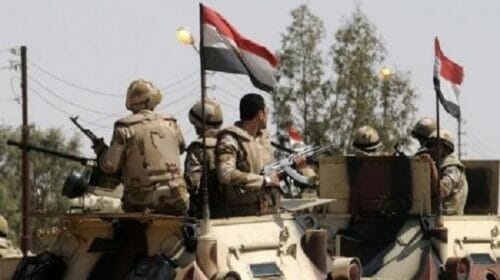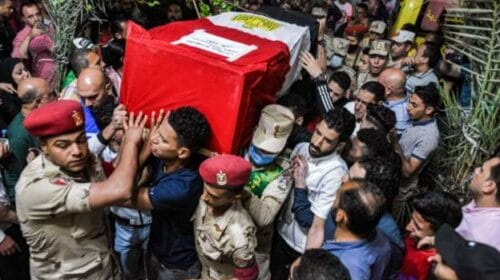Metrojet crash in Egypt initiates airport security review
Egyptian airport security standards criticised
Media coverage following the crash of the Metrojet flight to Saint Petersburg drew attention to extensive security failings at Sharm el-Sheikh airport. Criticisms have included allegations of scanning machines rarely being used, bribery of security guards, and reports that only 20-30 percent of airport employees were subject to searches on entry to the airport. The incident has also led to scrutiny of other Egyptian airports, reinforced by reports that two criminals were able to breach a perimeter fence at Hurghada airport on 1 November.
Though the cause of the crash has not yet been made clear, speculation by UK and US authorities has pointed to the possibility of a bomb in the luggage compartment or near the skin of the aircraft, leading to concerns it was planted by a member of staff or supplier. None of the crew or passengers on board the flight have yet been identified as a potential suspect.
Responding to criticism of lax security, Egyptian authorities have increased physical searches of airport personnel at Sharm el-Sheikh to include all staff, including guards and caterers. International teams have also been deployed to examine the scanning of passengers, cargo and baggage, as well as catering teams and security guards at Cairo International Airport. The introduction of more security equipment, tighter baggage checks and improved employee screening is likely to continue at Egyptian airports in an effort to reassure airlines and passengers that preventative measures are being taken.
Short-term impacts
The alleged security breach has already prompted several airlines and airports to review their operations and security procedures. Russia suspended all flights to Egypt on 6 November, amid concerns over security at Sharm el-Sheikh airport, and indicated that the ban might last several months and could be applied to other countries considered to be vulnerable to terrorism. On 13 November, Russian authorities announced they were temporarily banning flights to the country from national carrier Egypt Air, the only airline still operating direct services between both countries since the Metrojet crash. Several international airlines have temporarily suspended flights to Sharm el-Sheikh, and KLM restricted passengers flying from Cairo to only carry hand luggage on 10 November.
The security fallout is not limited to Egypt. Western authorities, concerned by the threat from Islamic State, have encouraged airports with perceived vulnerabilities to increase security measures. Britains Secretary of State for Defence Philip Hammond said that a confirmation of the reports of an IS bombing would prompt a review of aviation security in countries where the militant group is active. This was reiterated by Prime Minister David Cameron in the wake of the 13 November IS attacks in Paris, when he announced a review of airports used by British travellers around the world, as well as more advice, training and equipment for local authorities at those airports. The full details of these plans are to be outlined in the five-year strategic defence review, to be published on 23 November.
The US Department of Homeland Security announced a review of security on flights to the US, especially from ten unnamed airports where it was considering providing security assistance. Countries that are both heavily dependent on tourism and facing terrorism threats from Islamic State, including Jordan, Lebanon, Turkey and Tunisia, are likely to be among these. On 9 November, Tunisian authorities announced increased checks of passengers, baggage, and airport employees, as well as aircraft maintenance equipment. According to Al-Jazeera, Algeria also said it would increase the police presence at airports, perimeters and baggage inspection.
The Metrojet incident has also cast a spotlight on the prospect of an insider threat at airports, which requires an alternative security response. The TSA earlier this year rejected full screening of all airport staff on the grounds of cost but an associated Aviation Security Advisory Committee report did advise on increased random searches of staff and reduced access to sensitive areas. Physical security measures alone will not suffice and airports will continue to face challenges from both staff corruption and disillusionment that could be exploited by extremists seeking access to secure areas.
Longer term
The immediate security changes introduced at airports will increase direct costs for additional staff or security equipment, as well as potentially disrupting efficiency and causing delays. There will likely be some resistance from the aviation industry to knee-jerk measures, for example proposals for passengers to identify their luggage before being loaded onto aircraft. Nonetheless, airports will inevitably feel pressure to adopt tighter security practices due to reputational and competitive disadvantages of perceived non-compliance with new security norms.
Longer term obligations on airport operators will be shaped by the outcome of an investigation into the Sinai crash and subsequent security assessments, such as the eight-day International Civil Aviation Organisation (ICAO) inspection of Cairo Airport, which it passed on 12 November. Aviation experts have called for an international framework to address airport security issues, perhaps building on existing US Transportation Security Administration (TSA) and International Civil Aviation Organisation Standards and Recommended Practices (SARPs). Inevitably for airport operators, the need to enhance security, remain competitive and provide assurances to airlines, will have to be balanced with avoiding disruption and unviable costs.



